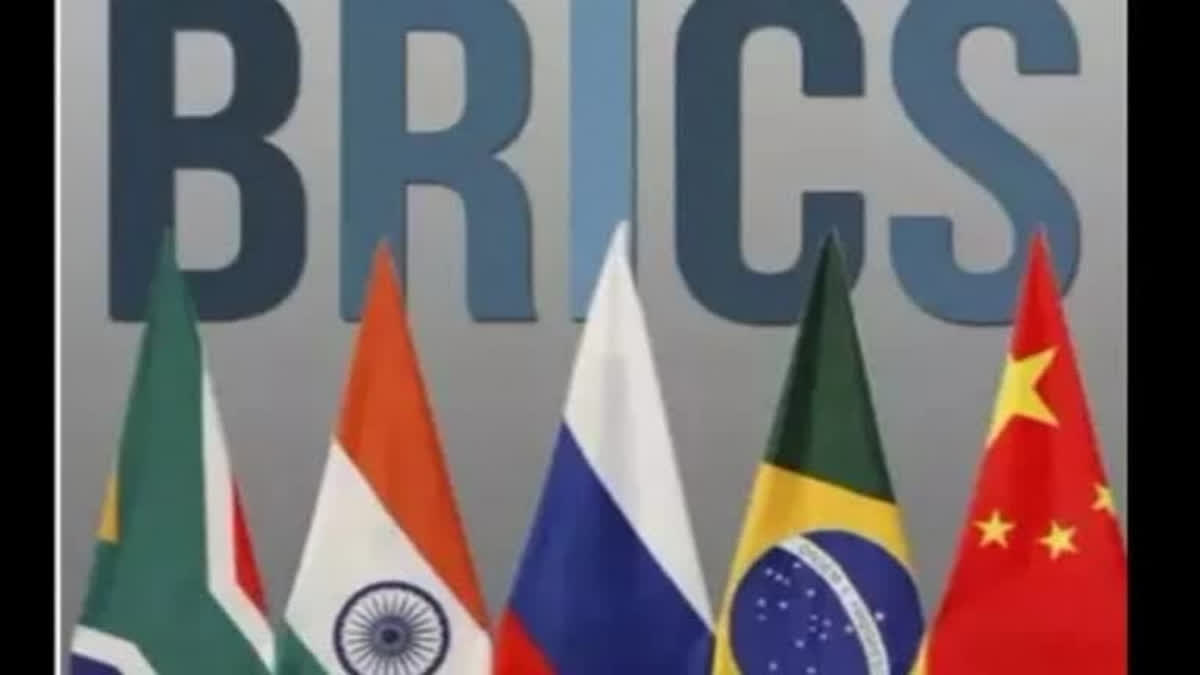New Delhi: With South Africa set to host this year’s BRICS summit in Johannesburg on August 22-23, speculations are rife over the issue of the bloc’s expansion. This is the issue that is at the top of the agenda in this year's summit.
Originally named BRIC (Brazil, Russia, India, and China), the bloc came to be known as BRICS with the addition of South Africa in 2010. The BRICS countries have a combined area of 39,746,220 sq km and an estimated total population of about 3.24 billion accounting for about 26.7 percent of the world’s land surface and over 41 percent of the global population. The combined gross domestic product (GDP) of the BRICS member states is $26 trillion, which accounts for 31.5 percent of the global economy.
Also read: PM Modi, Iran Prez Raisi discuss bilateral ties, BRICS expansion
Expansion of the BRICS bloc is on top of the agenda in this year’s summit. Around 40 countries have expressed their interest in joining the bloc, 22 of them officially. These include Egypt in Africa, Iran, Saudi Arabia, and the United Arab Emirates in West Asia, and Argentina and Venezuela in South America. In fact, as the host of this year’s summit, South African President Cyril Ramaphosa invited Bangladesh to be a part of the bloc during a meeting with the Prime Minister of India’s eastern neighbour Sheikh Hasina in Geneva in June this year. Since 2021, Bangladesh has been a member of the New Development Bank established by BRICS.
Earlier this week, Prime Minister Narendra Modi also discussed the possibility of expanding the bloc during a telephonic conversation with Iranian President Seyyed Ebrahim Raisi. “The two leaders also discussed cooperation at multilateral forums, including expansion of BRICS, and looked forward to their meeting on the margins of forthcoming BRICS summit in South Africa,” the External Affairs Ministry said in a statement following the conversation.
This came amidst Western media reports suggesting that India was opposed to the expansion of BRICS. Earlier this month, India had dismissed these reports but limited its stand to New Delhi not blocking the idea.
“As mandated by the leaders last year, BRICS members are internally discussing the guiding principles, the standards, criteria, and procedures for the BRICS expansion process on the basis of full consultation and consensus,” External Affairs Ministry spokesperson Arindam Bagchi said in a media briefing. “As our External Affairs Minister (S Jaishankar) had mentioned, we are approaching this with an open mind and a positive outlook. We have seen some baseless speculation… This is simply not true,” Bagchi added.
BRICS, as BRIC in the absence of South Africa then, held its first formal summit in Yekaterinburg, Russia, in 2009. The term BRIC was originally developed in the context of foreign investment strategies. It was introduced in the 2001 publication, ‘Building Better Global Economic BRICs’ by then chairman of Goldman Sachs Asset Management, Jim O'Neill. The term was coined by Roopa Purushothaman, who was a research assistant in the original report.
Since then, BRICS has evolved from more than an idea for investment destinations to a voice of the Global South as an alternative to the Group of Seven (G7) bloc of developed nations. So, is it feasible and logical to expand the membership of BRICS? Different member states of the bloc have different reasons.
Russia, for one, wants the expansion of BRICS given Moscow’s isolation in the international order because of the war with Ukraine. "This is a very important topic because we see that more and more countries are making statements about their intention of joining BRICS," Kremlin spokesperson Dmitry Peskov told reporters earlier this month."In general, such interest in the BRICS group shows the great potential of the association, its growing authority, and, most importantly, the practical importance of this association."
On the other hand, China believes that the BRICS grouping helps them to adapt to and actively shape the transition towards a multipolar order capable of constraining the US’ room for manoeuvre, and increasing that of emerging powers. But this is exactly where India has a problem with.
“India has tried to resist China’s efforts to turn the BRICS group into a support organization for China’s geopolitical agenda, such as promoting Beijing’s Belt and Road Initiative, its global development initiative, and explicit anti-US rhetoric,” writes Hung Tran, Senior Fellow at the Atlantic Council’s GeoEconomics Center. “Instead, India has focused BRICS discussions and activities on South-South economic and financial cooperation projects, initiatives to reduce global reliance on the US dollar-based international financial and payment system, and reforms of international financial institutions to give developing countries more voice and representation.”
Brazil, meanwhile, too has scotched reports that it is opposed to BRICS expansion and said that it will welcome new member states so long as they comply with the bloc’s rules. “Possibly, in this meeting, we can already consensually decide which new countries can join BRICS,” Brazilian President Luiz Inacio Lula da Silva told reporters in Brasilia. “I am of the opinion that as many countries want to enter if they are in compliance with the rules we are establishing, we will accept the countries’ entrance.”
This year’s host nation of the summit South Africa believes that the expansion of BRICS is necessary for the inclusion of the Global South in multilateral systems. South African International Relations and Cooperation Minister Naledi Pandor said that BRICS nations wanted to show "global leadership in addressing the needs... of the majority of the world, namely... development and inclusion of the Global South in multilateral systems."
So, can the BRICS member states come on the same page as far as the expansion of the bloc is concerned? That is the trillion-dollar question.


